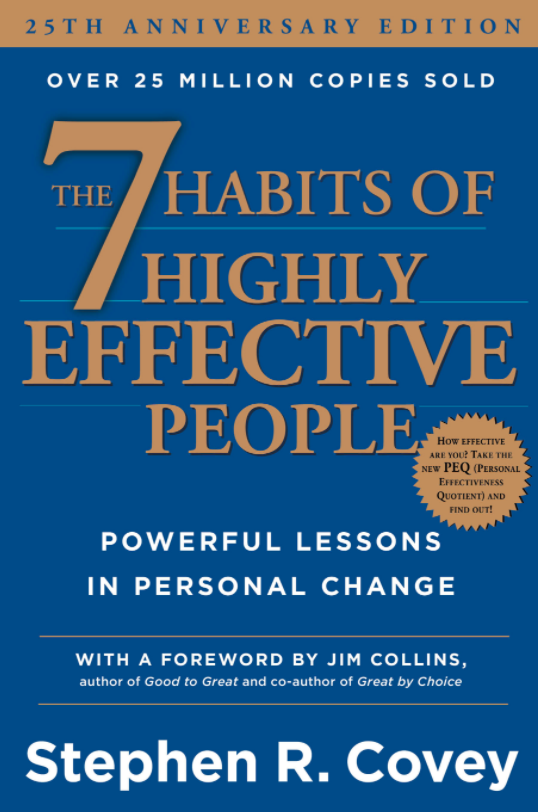
‘The 7 Habits of Highly Effective People’ by Dr. Stephen R. Covey is one of the most popular books worldwide. From the CEO’s of the biggest multinationals to the President of biggest democracies, the book has made a major impact on their lives. First published in 1989, the book has sold more than 25 million copies and has been translated into 40 languages throughout the world.
What really stands out in the book is that the timelessness of the tips it gives that can potentially change your life. It urges for a proactive attitude towards life. Since one does not have control over the external conditions, instead of worrying about them, focus and time should be invested on things that can be executed well. While a reactive person will have complaints and wishfully think that ‘he had a better boss’, the proactive person will try to ‘be the boss’ that everybody can look upto.
‘ I am not a product of my circumstances. I am a product of my decisions.’
An MBA from Harvard University, Covey carries a legacy of principle based leadership. In the book, he talks about the principals from values. He says ‘A gang of thieves can share values, but they are acting in violation of the fundamental principles we are talking about’. He says that the personal ‘mission statement’ can be a guiding principle in the life. Drawing analogies with the epithet in a tombstone, he tells that the mission statement should be the words in which people would like to remember you once you are dead.
‘Most of us spend too much time on what is urgent and not enough time on what is important’.
The thing that I liked the most of the book was on the tip of time management. He proposes a four point matrix to manage tasks more efficiently.
| Urgent | Not urgent | |
| Important | Quadrant I | Quadrant II |
| Not important | Quadrant III | Quadrant IV |
If tasks are urgent and important (QuadrantI) , it has to be done anyway. But the key is to organize the not urgent, but still important tasks (Quadrant II) in such a way that they don’t reach the Quadrant I. In that way most effective people are able to manage their life efficiently. He says that ineffective people spend their time on not things in Quadrant III and Quadrant IV respectively.
Elaborating on the non important things, he says : You have to decide what your highest priorities are and have the courage—pleasantly, smilingly, non apologetically, to say “no” to other things. He tells that saying a ‘no’ under these conditions can be difficult because most of the time, the ‘no’ is an unpopular choice.
Planning is a very important step for a person to move towards efficiency. He says that one should plan the activities in Quadrant II on a weekly basis, and review it daily to fine tune them.Weekly organizing, through the makes goals which are in accordance with the roles we perform in the real life. He makes a very important distinction between plans – the ones to schedule and other ones to delegate.
Importance of team-work is a key concept that that has been discussed at length in the book. On delegation of responsibilities, Covey says ‘Many people refuse to delegate the power to other people because they feel that it takes too much time and effort and that they can do the job better themselves.’ He talks ‘Stewardship Delegation’, which is focussed on results instead of methods. It gives team members choice of methods and makes them responsible for results.
The key of any team work is that the expectations should be made explicit from the very beginning. Covey believes that it is very important to clarify expectations from each team member. Unclear expectations in area of goals often undermine communication and breed a trust deficit. He admits that clarifying expectations can sometimes take great deal of courage, as it seems easier to act as if differences don’t exist and hope things will work out. But this approach is not right.
Covey has a very important tip on verbal communication. We spend years learning how to write and speak. But do we have the training to enable us to listen others ? While eager to get out point across, we often ignore the views of other person completely. Even if we listen, we do that to reply and not to understand. He says that in Greek Philosophy, good listening is embodied in three sequentially arranged words : ethos (integrity and competency), pathos (empathy) and lagos (logic, the reasoning part of the presentation). Seek first to understand, and then be understood.
Covey talks about establishing a synergy and creating a win win situation for all to deal with conflicts. In situations of conflict, Covey advises, we should attempt to understand the concerns underlying that person’s position. The negative energy, that of insult, needs to be sidestepped and criticisms of others can be used to improve your point of view and enlarge your perspective. The attempt should be to create a win – win and not a win or lose situation in teams.
|
He lays stress on ‘sharpening the saw’, to have a balanced program for self-renewal in the four areas of your life: physical, social/emotional, mental, and spiritual. Reading a book a week is a good way to keep our thoughts rejuvenated.
After reading the book, I have some unanswered questions. First, when Covey talks about the not making priorities in life, why is he only concerned about the ones that suits a person’s objectives ? In practical world, for instance in the war duties, a soldier has to go and fight even if he is not convinced the war rhetoric. Second, the ‘win-win’ situation talked by Covey does not apply to competitions. Professor Martin W. Sivula, in his critique (2014) to the book challenges Covey’s assertion “all parties feel good about the decision and feel committed to the action” on the basis of game theory which establishes that world is not a zero sum game. I hope to get these answers in his other books.
( About the Author : Stephen R. Covey, did his M.B.A. from Harvard University and a doctorate from Brigham Young University. He also received 12 honorary doctorates from various universities.)

